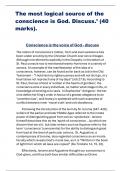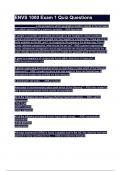The most logical source of the
conscience is God. Discuss.’ (40
marks).
Conscience is the voice of God - discuss
The notion of conscience's matter, form and even existence has
been under scrutiny by the Christian Church ever since it began.
Although not referred to explicitly in the Gospels, in the letters of
St. Paul conscie nce is mentioned twenty-five times in a variety of
senses. An example of the manifestation of the idea of a
conscience, however, can be found as far back as Job in the Old
Testament - “I hold fast my righteousness and will not let it go, m y
heart does not reproach any of my days” (Job 27:6). According to
St. Paul, the law of God is ‘written in the hearts of gentiles'; the
conscience acts in every individual, no matter what stage in life, or
knowledge of existing civic laws. In Sophocles' ‘Antigone', the her
oine defies her King's order in favour of a greater allegiance to an
"unwritten law", and history is spattered with such examples of
conflict between inner ‘moral truth' and civil obedience.
Following the introduction of the term by St. Jerome (347 -420),
writers of the earlier and later Middle Ages referred to the innate
power of distinguishing good from evil as ‘synderesis'. Jerome
himself describes this as the ‘spark of conscience ...by which we
discern that we sin', but later writers such as Aquinas refer to the
term ‘conscience' (conscientia) for the ability to distinguish good
from bad at the level of particular actions. St. Augustine, a
contemporary of Jerome, also regarded conscience as an innate
faculty which reveals God's moral law, as it is “Written in the book
of light from which all laws are copied” (De Trinitate 14, 15, 22).
Effectively, Jerome and Augustine thought our conscience is
God-given, and thus both face similar difficulties as Divine
, Command theory. Arguably, Augustine and Jerome believe the
capability of reason to be far greater than it really is. The
Aristotelian line of thought differs from Plato's in a subtle but
important way, that although reason is innate and universal, it
needs to be used to arrive at an understanding of right and wrong.
Augustine doesn't ‘use' reason; he views knowledge of right and
wrong as intuitive and automatic, which is problematic. First, the
idea of moral relativism becomes more convincing as historical
and social enquiry lends us more information about other
cultures, and although it does not deny Aristotle's universal
reason, it does deny a universal understanding of right and wrong.
In addition, if God had said that rape, murder and torture are
desirable values, then they would have been. This begins the
series of problems presented by Plato's Euthyphro dilemma,
which affects all theories claiming God's word as the dictate of
right and wrong.
Pelagius, an ascetic monk, recognised that humans have the
capacity to decide whether or not to follow the good. Even if one
knew something was wrong, such as torture of an innocent child,
one still has the potential to carry it out. However, in the Biblical
tradition, God's grace does not necessarily drive people to the
right action (we would have a very different picture of Christian
morality if it was believed that it does) but instead, in Ephesians,
“The forgiveness of sins, in accordance with the riches of God's
grace”. Conscience may be the voice of God, therefore, but we
still have the capacity to ignore it, or actively disobey it.
Peter Singer poses a situation where a group of animal rights
protesters are deciding whether they should break the law to stop
a practice they know to be wrong. An answer to this type of
question was given by the nineteenth-century American radical,
Henry Thoreau. In his essay ‘Civil Disobedience', Thoreau wrote,
“It is not desirable to cultivate a respect for the law, so much as
for the right”. The American philosopher Henry Wolff has written
in a similar vein, saying that a man should “make himself the
author of his decisions”, and to resist the state who try to lay
authority over him. Both Thoreau and Wolff resolve the conflict





